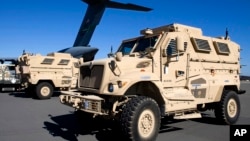The United States is giving Uzbekistan hundreds of military vehicles, says a top U.S. diplomat in an exclusive interview with VOA Uzbek. It is one of the largest equipment transfers by the United States to a Central Asian nation and a move likely to renew concerns over Uzbekistan's human rights record.
Daniel Rosenblum, Deputy Assistant Secretary of State for Central Asia, said Uzbekistan needs the vehicles for counter-terrorism and counter-narcotic efforts.
The transfer includes 308 Mine-Resistant Ambush Protected Vehicles (MRAPs) and 20 Armored Recovery Vehicles to Uzbekistan, as part of the U.S. government's Excess Defense Articles Program. New MRAPs cost about $1 million apiece, while armored recovery vehicles are priced at about $2 million each.
"They will all be provided to the Ministry of Defense and can only be used by the Ministry of Defense," said Rosenblum. "These are definitely defensive vehicles, they are inherently defensive. Also, we consider them to be non-lethal. They are intended to protect personnel, crews and passengers in areas that there might be explosive devices, mines, so on."
Rosenblum says the delivery began last December and the Uzbek government is covering the cost of transportation. He says the excess military equipment is offered "as is, where is."
"That is the terms that are used, meaning in the condition that they are, good or bad," he said. "But we hope that it is good enough to be used obviously and wherever the location is. These MRAPs were at number of different locations. None were in Afghanistan by the way."
He adds some of the vehicles were in the United States and some were in overseas locations.
The top U.S. diplomat for the region says the Unites States has made similar offers to other Central Asian countries, and that Tajikistan and Kazakhstan have expressed interest. Rosenblum describes it as a two-way, transparent process, in which the United States assesses if they have excess equipment that is needed by others.
A partner in Afghanistan
Uzbekistan has been Washington's partner in the war in Afghanistan, providing logistical support to the U.S.-led coalition since 2001. Uzbekistan is seen as a key part of the Northern Distribution Network through which the United States transferred non-lethal supplies to Afghanistan as an alternative to unstable supply lines through Pakistan.
As for direct military transfers, the U.S. Congress in 2004 restricted such assistance as a consequence of Uzbekistan's human rights record. The State Department and Human Rights Watch, among others, have repeatedly condemned documented, widespread use of torture, imprisonment of civil society activists and religious figures, and the use of forced labor in the Uzbekistans key cotton sector.
But in early 2012, in a move widely criticized by Uzbek activists and human rights groups, the Obama administration exercised congressionally-granted authority to waive rights-related sanctions, and re-started military aid to Tashkent.
Human rights record
News of the current transfer is likely to anger international rights organizations and activists, who have argued that providing military assistance rewards an oppressive regime, led by President Islam Karimov who has held the post for nearly a quarter century.
On the eve of high-level talks last year between Washington and Tashkent, Human Rights Watch called for the U.S. government to adopt a tougher stance on Uzbekistan’s human rights record, including a suspension of military assistance and consideration of targeted sanctions.
“It should be made clear to Uzbek officials that their government’s continuing repression will result in meaningful, and if need be, punitive policy consequences,” said Steve Swerdlow, Central Asia researcher at Human Rights Watch, in a November 30 statement. “Knowing they’ll be held to account for abusive conduct might make Uzbek authorities think twice.”
Citing the Uzbek government’s responsibility in 2005 for the killing of largely peaceful protesters in the eastern Uzbek city of Andijan, Human Rights Watch and other activists have also voiced concern that while classified as nonlethal, the military equipment being provided here could be used by Uzbek officials to quell domestic civil unrest or peaceful protests.
Other experts and policymakers say that by strengthening the security relationship, Washington is opening up opportunities and new ways to work with a government that has long held on to an insular foreign policy distrustful of outside intervention.
"We want to maintain a robust relationship, robust level of cooperation in all areas," said Rosenblum. "Security is an area where we do share interests and concerns. We also are worried about terrorist threats. We are very concerned about a narcotic trafficking that goes through the region and in those areas we want to cooperate."
"At the same time, it is very much a part of our policy in the region and globally, frankly, to emphasize the importance of democratic development and respect for international human rights," said Rosenblum. "And that is not because of our values that drive a lot of this, but also because in the long term, that is the best guarantee of stability in all these countries."
He describes engagement with Uzbekistan on such issues as democracy and human rights as well as security as robust.
"We think it is possible to pursue both and try to maintain that balance in the relationship," he said.
Rosenblum says America will work with whomever is elected president in elections slated for March and that promoting freedom and democracy will remain on top of the agenda.
That is widely expected to be Karimov, for whom it would be a fourth term, despite a constitutional limit of two presidential terms.
The Obama administration has recently renewed its ambassadors to Uzbekistan, Kazakhstan, Turkmenistan and Kyrgyzstan. There is a new Central Asia strategy in place, says Rosenblum, but no major shifts in policy are expected.




